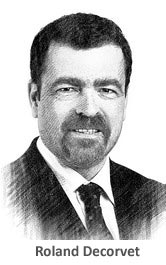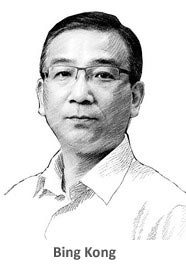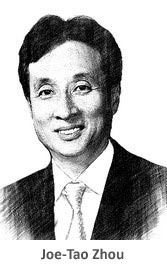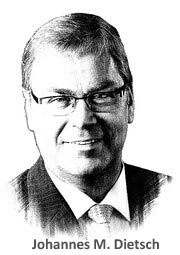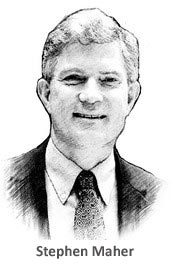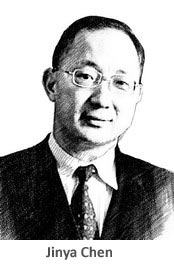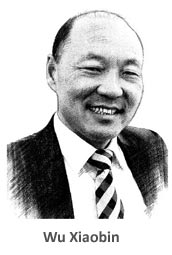|
 |
|
|
Editor's Note: The world's attention is again focused on China as it convenes the annual full sessions of the National People's Congress and the National Committee of the Chinese People's Political Consultative Conference. The full sessions of the top legislature and the top political advisory body are held to discuss and adopt policies to deliver the wide-ranging reform promises made during the Third Plenum of the 18th Central Committee of the Communist Party of China in November last year. As a major economic force, multinational companies attach great importance to the annual "two sessions", where policy priorities and targets for the year are set. Over the years, the "two sessions" have successfully navigated the development of China, which is not only very important to the country itself but also matters to the world. China Daily interviewed executives from global businesses operating in China to get their opinions and ideas.
 |
|
|
Farmers must be empowered to become entrepreneurs. I believe Chinese farmers can be small companies. There are too many farmers and small plots of land; they need to be able to consolidate for better productivity.

This year will be better than last year but still will have the same trend. Overall, we are confident because we are focusing on the domestic economy. In 2014, in catering, we are changing to medium-priced restaurants rather than expensive restaurants and focusing on mainstream restaurants. We also are focusing more on consumption and less on gifting.
We have invested close to $500 million every year on new equipment and new machinery in China and will continue to do that in the foreseeable future. We are doing about $7 billion in business, but we still have a lot of room to grow. One of the priorities for us is to understand the Chinese consumer and become a model company, which is different from what we have in other countries. China is competitive, fast and innovative. Working with Chinese partners, you cannot manage Chinese entrepreneurs as you can manage foreign ones because they are faster, more flexible and innovative. Nestle's model in China has to be different from anywhere else. We have to put on our Chinese glasses and leave our Western glasses at home.
The biggest environmental problem has to do not so much with investment or business decisions but with recruitment. We are really struggling to convince people to work and live in Beijing, especially people with children. We certainly don't want to expand our office here. We'd rather expand to other places outside of Beijing. ----- Roland Decorvet |
|
|
The country should do more to rebalance the economy while it strives to maintain economic growth alongside sustainable development. KUKA, as the manufacturer of industrial robots, expects that strong support from the Chinese government in the intelligent manufacturing equipment industry will facilitate the transformation and upgrading of the industrial structure in China.
In 2013, China was the second-largest country for industrial robots (23,000 robots shipments in 2012 and around 25,000 in 2013). For this, we at KUKA firmly believe we are ready for fierce competition because of our state-of-the-art technology and solid experience. Our broad product portfolio and localized customer service will meet client's demands and match the trend of China's manufacturing industry to a very high degree. KUKA is well-positioned to facilitate the development of China's automation and manufacturing. With our customer-oriented service, future innovation and safe technology, we are confident about our future in China.
----- Bing Kong |
|
|
China is now at a crucial point in its development path. It has to avoid falling into what economists call the "middle income trap." To avoid this trap, China needs to attract both capital and technological innovation that will raise its labor productivity, wages and domestic consumption. Raising domestic consumption will also insulate China's economy from global economic shocks, since it will be less dependent on exports. China's leadership has always been committed to the nation's economic development. The urbanization strategy adopted by the new leadership is a good transitional step. By raising the wages and living standards of the rural population, the strategy will ultimately help with rebalancing the overall growth strategy toward domestic consumption-led growth. The next step should be to make the economic environment more attractive to capital and technological innovation, which will set China on a path to continually increasing labor productivity, wages and standards of living.
The softness of the general economic situation over the past two years brought increasing challenges to many multinational corporations. But managing through periods of economic turmoil is easier for Eaton, due to the diversification of our business over the past decade. Our broad mix of businesses allows the company to perform in the early, middle and late stages of the economic cycle. Our strategy seeks balance in a mix of business segments, in geographic footprints and throughout the economic cycle.
China has developed sufficiently and grown to a large enough scale that further sustained economic growth can come only by raising labor productivity, rather than just tapping more low-cost labor. Labor productivity can be raised by innovation and the use of more advanced technology.
Eaton has a wide range of innovative technologies, partnerships and investments that are helping China to meet its sustainability goals, as we have highlighted in Eaton's China Sustainability Report, published since 2008. ----- Joe-Tao Zhou |
|
|
With accumulated wealth, problems like environmental pollution and waste of resources have also inevitably escalated. We expect that the government report will touch on welfare, education, medical reform and environmental protection. China is further deepening its reform and will continue to open up. We are delighted to see that recently, the Chinese government has carried out further decentralization. The State Council has canceled or decentralized more than 300 administrative approval items, thereby optimizing the business environment. In addition, the market is set to play a "decisive" role in allocating resources in the economy, which will boost competition and economic efficiency. These reforms are meant to promote a stronger orientation toward the market and to remodel the relationship between the government and industry. These measures will have a profound influence on ensuring continued stable, sustainable economic development. 
With our knowledge and experience, we are in a position to help China accomplish some of its main long-term objectives — to grow economically, in a profitable yet sustainable way, as well as to rebalance the economy. Intellectual property protection is also often discussed, but it's a necessary condition to bring latest technology and innovation into the chain. Finding proper protection for the innovator is of outmost importance for developing an R&D-oriented culture.
Bayer's roots in China go back 132 years, when it provided textile dyes. Today, the greater China market is Bayer's third-largest single market globally and the first in the Asia-Pacific region. We have successfully developed our business here and we are committed to further invest in this market and to bring the most innovative technology and products to China, supporting the idea of turning "Made in China" into "Created in China".
Recently, the government announced a catalogue of measures to further safeguard the environment, such as the introduction of an action plan to strengthen emergency management of air pollution and measures to control haze. It will also compile an action plan to prevent water pollution and gradually build a comprehensive system of environmental protection. From these efforts, we can see that China aims to set up an integrated system to tackle its environmental issues in the long run. In the local "two sessions" held earlier this year, 22 local governments lowered their GDP growth targets for 2014, which demonstrates their firm determination to transform the economy and put it on a more sustainable growth pattern. ----- Johannes M. Dietsch |
|
|
We continue to strive to be seen as the gold standard in our industry for environmental compliance and management. This is not easy in a country as large as China and with as large a footprint as our operations have in China, but we are committed to this priority. ----- Stephen Maher |
|
|
China therefore needs to take calculated steps in an expeditious manner in its handling of overcapacity to avoid a hard economic landing and to build a sustainable economic growth model. China also lacks a solid wealth distribution system because of the fast increase of wealth in an uneven manner. Furthermore, the nation needs a strong and solid social welfare system to provide basic coverage to the majority of people. To that end, starting this year, China is undergoing a redesign and restructure of the wealth distribution system and building a basic social welfare foundation. It also requires cleaner fuels for sustainable growth which involve a huge investment in purifying the use of traditional fuel and the economical use of new fuel. An innovative way of handling shadow banks to make the banking system more pro-business and devoted to sustainable growth, controlling local loans effectively, is essential. Another aspect of vital reform involves starting the process of building a sustainable growth model and creating a healthy wealth distribution system. The Chinese government needs to spend more time continuously growing the economy while at the same time paying special attention to preventing new pollution. It is important everyone knows China needs continuous growth and the creation of wealth to solve many social problems that are the leftovers of the country's history. For people to concentrate more on economic growth, the Chinese government needs to redesign and restructure its wealth distribution system. The country needs to maintain a free flow and interaction among various groups of people. People need to feel that opportunities are open equally and fairly to them.
More clean energy should be considered for use in the aluminum industry, especially when it comes to the smelting business. Of course, extensive use of aluminum in mid- and downstream enterprises will significantly reduce the weight of mobile equipment that, in turn, will help reduce emissions and the consumption of energy. That is one of the reasons Alcoa chose to work in China in mid- and downstream businesses.
----- Jinya Chen |
|
|
We would like to see new policy breakthroughs in 2014 to fulfill the promise of building a fair, open and transparent market with unified rules and regulations that will provide equal market access and investment prospects for all participants, thus giving rise to new growth potential and creating new opportunities.
In the meantime, the anticipated slowing of the economy means the end of hyper-growth for the golden age of China's premium auto market, giving rise to a more challenging sales environment and more fierce competition. The rapidly rising costs of labor, land and utilities are posing challenges to our overall planning and business operations. However, we believe China's premium segment still has very bright prospects for at least another five to 10 years and the country is on its way to becoming the world's largest luxury auto market, maybe overtaking the US this year. A new round of reforms and urbanization will create new demand, while the pace of people upgrading vehicles will also pick up as the result of rising incomes and changing lifestyles. We've found that people in mature markets are more likely to diversify their choice of brands. For example in the US, the three German auto brands take up a combined market share of 49 percent, while for China it is 78 percent. So, as the market matures, we will see the Chinese diversifying their choices, creating great opportunities for Infiniti ahead.
We are implementing our China strategy to cover the key areas of brand-building, local production and customized product development for China. By the end of 2014, Infiniti will start producing two models — the tailor-made long wheelbase versions of the premium sports sedan Infiniti Q50 and the stylish sports SUV QX50 — at the Xiangyang plant in Hubei province, complementing our global production network including Japan, the US and the UK. This year we will introduce six new models in China with even more products in the pipeline to enrich our offerings. Leveraging our local production and portfolio expansion, we aim to increase our annual sales from last year's 17,108 to 100,000 by 2018. Our long-term objective is to develop Infiniti into a mainstream premium auto brand that enjoys the same recognition and prestige as the dominant German three.
We only sign up with those who share our commitment to the environment and strictly comply with State environment rules and regulations as our partners. Infiniti's local production in China will be conducted according to our global practices, which implement the highest environmental standards. ----- Daniel Kirchert |
|
|
China will present significant opportunities for pharmaceutical companies over the next five to 10 years. According to a number of sources, China's economy will continue on its strong trajectory of growth, with China healthcare spending projected to increase four times from 2010 to 2020. Meanwhile, the China pharmaceutical market will become the third-largest market globally by 2015. It is projected to grow by 4.4 times from 2010 to become a $250 billion market by 2020. This rapid economic growth will fuel urbanization, a growing middle-class population, more stable credit markets and increased investments by people and the government in healthcare. Moreover, the Chinese government's commitment to healthcare reform, infrastructure development and continuous improvement of reimbursement coverage will further drive market growth. We have also seen rising incidence rates of non-communicable diseases as a result of lifestyle changes brought about by increased economic wealth. For example, cardiovascular disease is the leading cause of death in China, and rates of stroke and cardiovascular disease are rising. Diagnosis and treatment rates are low, creating a considerable social and economic burden All these factors fuel demand for high-quality and affordable medicines and create opportunities for Pfizer and the pharmaceutical industry to provide healthcare solutions for the Chinese market. Pfizer will continue to bring innovative medicines to China to address the country's unmet health needs and will also continue to provide off-patent medicines, including branded generics, to address the medical needs of China. We will also work with the entire industry and support the Chinese government to further improve drug accessibility and affordability, improve the quality of China's drug sector so that it is on a par with international standards, encourage drug innovation and improve drug pricing mechanisms.
----- Wu Xiaobin |
|
|

Liberalization of the market in many industries is opening up new opportunities for companies, which will bring more competition. We support this move toward further liberalization, as it will be good for consumers, who can benefit from an increase of quality in services at competitive rates.
Air France and KLM always look for new opportunities, and we will closely follow the development of many cities in China. However, at this point, we do not have any plans for new routes in the near future. Our objective is to build on the strong network that we have and to optimize the existing routes in terms of aircraft type and frequency. A recent example is the launch of operations of the Airbus A380 to Shanghai for Air France, adding almost 20 percent capacity on this route. Air France will also operate an A380 to Hong Kong this summer.
Air France and KLM do their utmost to develop sustainable growth in the airline industry. This effort is rewarded by being the number one for nine years in a row in the Dow Jones Sustainability index for the airline industry. New techniques and possibilities — think of biofuel, for example — will certainly help to reduce the overall carbon footprint. ----- Bas Gerressen |
